This marks my first ever book review, and my aim with this is to help those who have always wanted to dive into the world of books, and yet find themselves unsure of where to start. Hopefully this will also spark some good conversations!
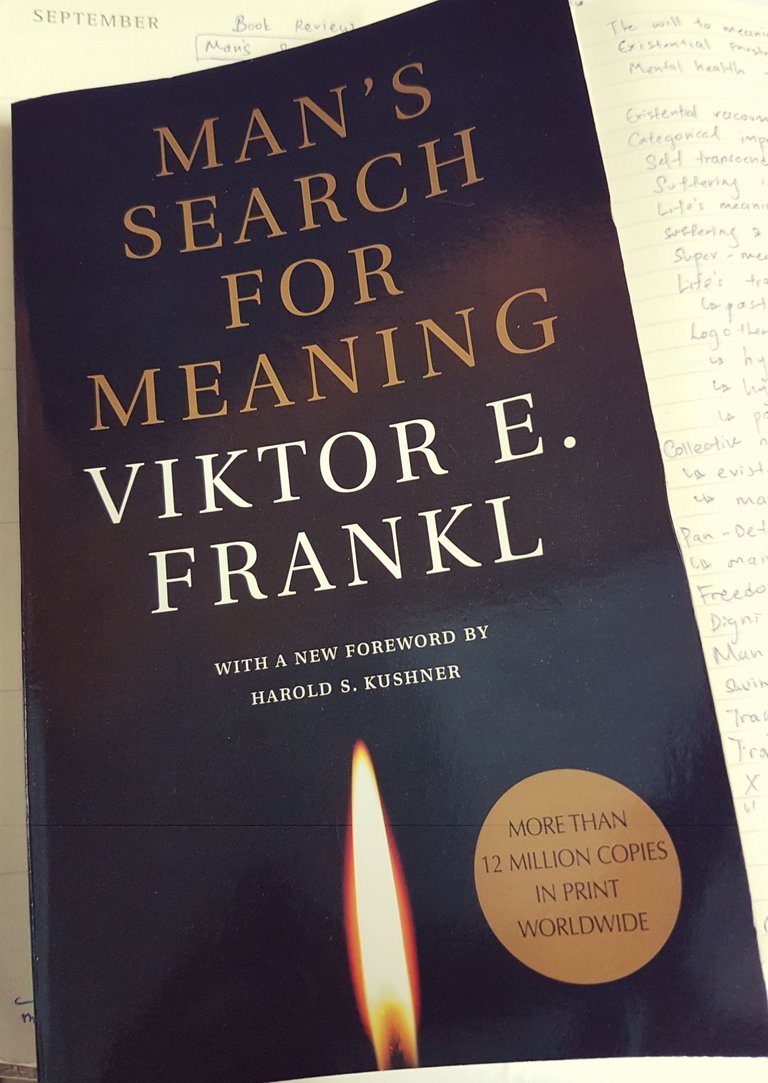
A few days back, on the 27th of January 2018 marked the 73rd anniversary of the Holocaust Remembrance Day.
For most Malaysians however, the events of world war II and the holocaust are but tiny sub-topics in our historical studies. The holocaust was reduced to about a page or less. In fact it's pretty commonplace to hear scathing remarks about the Jews from the locals here. A close friend of mine even once quipped that the holocaust was a made up event, and that Hitler wasn't really that bad.
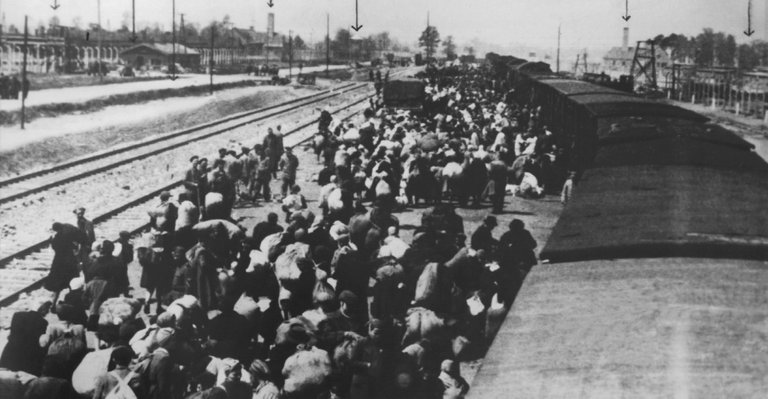
Prisoners arriving at Auschwitz
Background
This book was authored by Viktor Frankl, a trained neurologist, psychologist and holocaust survivor. Frankl, along with his entire family were deported to concentration camps. These camps were controlled by the SS and held members of the "inferior race" and those who were physically weak (mostly Jewish, criminals, and also the Roma gypsies). At these camps, prisoners were treated like animals by the guards and forced to do hard manual labor. Food was rationed out daily and usually consists of a single piece of bread and thin soup. As the war drew to a close, the SS forces were pushed back, food and medicine became even more scarce and prisoners contracted typhus and other diseases which led to mass deaths. It was common for the guards to beat up and mentally abuse prisoners for no reason at all. Certain concentration camps were equipped with gas chambers where industrial-scale mass murder of Jews took place. Among these camps stood one that towered over the rest - Auschwitz, where at least 1 million people died under horrific conditions.
Part 1 - Life in the concentration camps
The book is divided into two parts, the first half details Frankl's experience as an inmate in Auschwitz. He tries his best to describe the events as an objective observer instead of offering emotional accounts. Throughout the entire experience, he describes the psychological states that the inmates journey through, from that of naive hope to an apathy of death and a loss of human values, and finally the reaction to being liberated from the nightmare.
What really spoke to me in this portion were the intimate conversations between inmates, and the small joys/mercies that still existed in beholding the beauty of nature and art even in such dire conditions. Against the sombre backdrop, Frankl also contrasts inmates who let go of their moral values against those who strove to hold on to human dignity. He fervently believed that the one distinguishing trait that human's possessed was the freedom to choose good even when a person was physically, mentally and, spiritually spent.
We who lived in concentration camps can remember the men who walked through the huts comforting others, giving away their last piece of bread. They may have been few in number, but they offer sufficient proof that everything can be taken from a man but one thing: the last of the human freedoms - to choose one's attitude in any given set of circumstances to choose one's own way.
Frankl relates a few experiences where the camp guards showed kindness and even handed over their food rations to the inmates. These infrequent moments provided him enough proof that to be a decent human being was a choice, and that humans were not bound by environmental circumstances.
“From all this we may learn that there are two races of men in this world, but only these two — the “race” of the decent man and the “race” of the indecent man. Both are found everywhere; they penetrate into all groups of society. No group consists entirely of decent or indecent people.”

Survivors liberated
Part 2 - Logotherapy
A quick caveat regarding the second portion - it is considerably denser than the first half and presumes that the reader knows a little about psychology; it's use of certain references and terms can sometimes throw the reader off (in my opinion). The second half of the book talks about logotherapy - which represents the culmination of Frankl's experiences and unique insights into a psychological school of thought.
Logotherapy focuses on the meaning for human existence and man's pursuit of such meaning. Frankl is quick to define logotherapy as a will to meaning , as opposed to the will to pleasure which Freudian psychoanalysis (and modern psychology) is based on. To avoid technical terms, I'll attempt to explain this in layman language to the best of my ability.
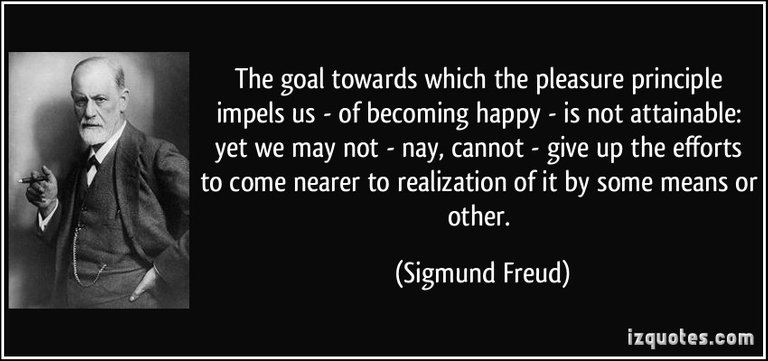
Source Image
Modern psychological treatment was heavily influenced by Sigmund Freud. The belief that happiness is the primary pursuit of every man. Freud was also heavily influenced by nihilism - the belief that there is no meaning to be found in life. That life itself is arbitrary and hence objective moral standards do not exist.
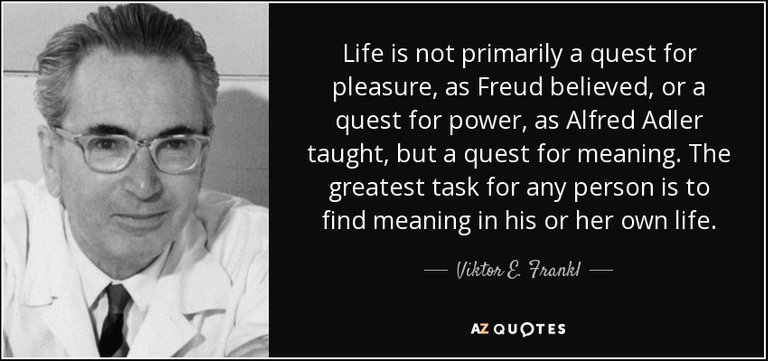
Source Image
What Frankl proposes instead with logotherapy is that man's primary pursuit isn't happiness, but instead a search for meaning. The tension which exist in each person is primarily because of this constant search. To Frankl, this existential frustration is indicative of our humanity, but that it can also lead to sickness if we shut ourselves off to it. Hence treatment by means of logotherapy is to assist a patient in finding meaning in his life - to reorient the patients attention onto something bigger than mere happiness or pain. And in finding this meaning, one would be able to endure any hardship and even count them as moments that have shaped his character for the better. Happiness is merely a by product of fulfilling one's life meaning, and not the other round.
As Nietzsche put it:
He who has a why to live can bear almost any how.
In contrast to Freud, Frankl believed that human life is of inherent value and not tied to a persons usefulness. In this, he expressed that meaning is ultimately found in activities that go beyond serving the self. The more one forgets himself in the pursuit of another's happiness (be it in love or charity), the more human he is and closer to realizing meaning in life.
There's a lot more which I will refrain from discussing so as to not spoil the good parts, but truthfully, the second part of the book was a delight for me to dig into. The tenets of logotherapy deeply resonated with me, especially as I've had many conversations with friends who have slipped into depression and don't seem to see the point of life anymore. I think if anything, logotherapy provides a new language to talk about depression and even addictions.
Critique
My only critique is that Frankl never really elaborates on the transcendental nature of this "meaning" to life. He speaks of meaning as unique to each individual, however this seems to me to be a very vague definition of meaning. Meaning to him can be found primarily in i. creating / doing deeds, ii. in encountering someone or something (love, nature, beauty), and iii. attitude we take towards unavoidable suffering. However, at times it feels as though the term "meaning " is merely a fictional construct employed to cure the patient out of his state of neuroses. Is there really true meaning to life, or is it just a placebo?
Frankl avoids references to his own religious beliefs, but there are strong hints that he does believe that meaning itself comes from a higher being. Alas, I believe this restraint on his part is also why he managed to break the divide of culture, race and religion to reach a wide audience of readers.
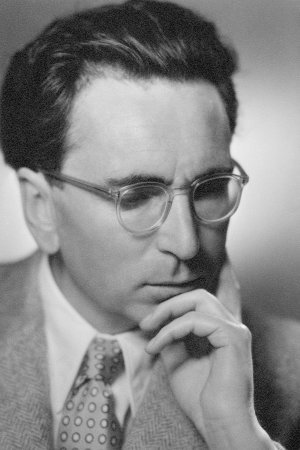
Viktor Frankl
Conclusion
I heartily recommend this book to anyone interested in psychology, history,existentialism, and the holocaust. It will also be helpful for those who are undergoing depression, and trying to make sense of what exactly is the point of living. With that said, thank you for reading until this point and I hope you enjoyed the somewhat lengthy read. I'll leave you with some of my favourite quotes from Frankl:
Our generation is realistic for we have come to know man as he really is. After all, man is that being who has invented the gas chambers of Auschwitz; however, he is also that being who has entered those gas chambers upright, with the Lord’s Prayer or Shema Yisrael on his lips.
So live as if you were living already for the second time and as if you had acted the first time as wrongly as you are about to act now!
Ultimately, man should not ask what the meaning of his life is, but rather must recognize that it is he who is asked. In a word, each man is questioned by life; and he can only answer to life by answering for his own life; to life he can only respond by being responsible.
Please upvote and comment if you found this review helpful. As this is my first review, do let me know if it's too long or too brief. Feedback is greatly appreciated.


This gem of a post was discovered by the OCD Team!
Reply to this comment if you accept, and are willing to let us share your gem of a post! By accepting this, you have a chance to receive extra rewards and one of your photos in this article may be used in our compilation post!
You can follow @ocd – learn more about the project and see other Gems! We strive for transparency.
@Ocd now has a witness, please vote for @ocd-witness to help support other undervalued authors!
Wow, thanks a lot. Really appreciate it. Sure I'm happy for this post to be shared!
Will vote for the @ocd-witness for the great job that you guys are doing for the undervalued posts. Thanks again for supporting!
Boom! Congratulations!
Wow, what an insightful post. I love how well you've written this review, and you've included a section up front on how the holocaust is taught/perceived in Malaysia, which lets the reader where your views are coming from. I really like how you compare Frankl to Freud and your critique of Frankl. This seems like a heavy going book (I'm not sure I could read it), but I think you've done a great job at analysing and simplifying the key messages. Well done. I look forward to more of your book reviews.
Thank you so much for dropping by and for the kind words! Really appreciate it. I wanted to write so that it would be accessible even to readers who don't know much about the holocaust, hence the brief introduction. Tried my best to explain in layman terms. Hopefully it made some sense.
It's actually not as heavy as it seems. Especially the first portion (around 100 pages) will be easy to read for most English speakers. Definitely should pick it up if you have the chance! Thank you once again for commenting and the encouragement. I hope to continue writing and producing good content.
I thoroughly enjoyed this review, @arwinzen. As an ethics professor, I frequently engage in discussions such as the meaning of life, happiness, and existentialism. I'm surprised that Frankl's understanding of the importance of finding meaning to life rather than happiness didn't lead him to the book of Ecclesiastes, where Solomon succinctly declares:
Man's Search for Meaning sounds like one I would really like to read. Thanks for sharing!
Thanks for reading! Ethics is something that I'm really interested in as well, will def check your blog out.
Ecclesiastes is one of the most profound books in the Old Testament. I pick it up whenever I need a reminder that life is finite and but a vapor. Thanks for the insightful comment and you definitely should pick up Man's Search for Meaning when you have the chance.
bro.. psychology book wow... interesting to read your post but if you ask me to read this book, no way man. hahaha
The first part of the book is actually pretty easy to read! I'm sure you can read it. It's only the second part that is a little heavier.
maybe fall asleep on 2nd page
Hahaha nah definitely can read at least the first 100 pages!
Great review of the book, thanks.
Have a copy of the book but haven't read finished yet..
This review comes handy 😊
You're most welcome! I hope it's helpful for when you start reading it again. Thanks for dropping by :)
Nicely done! This is definitely one of the most important books in the psychology/philosophy field-- read it many years ago, and much still stays with me!
Thank you for reading! Really appreciate it. Hope it was a good refresher on the book then. It definitely is one of the most impactful books that I'v read.
I had read this book decades ago and it still had a great impact on me. The gist of the book, nothing in life has meaning, but the meaning that you give it. Highly recommended.
Thanks for dropping by! Definitely will leave an impact on me as well. At the end of the day, we all want to live meaningful lives. I've actually been following your account before this :) Appreciate that you commented!
I loved reading this book for the first time. It's an amazing, insightful, and inspiring read. Everyone should give it a go. Frankl was a clear seeing visionary.
Thanks for dropping by! Yupp definately agree with Frankl being a visionary. So much of what he said then about our generation suffering an existential vacuum due to boredom is exactly what's happening now, especially with the advent of social media.
@originalworks
Congratulations @arwinzen! You have completed some achievement on Steemit and have been rewarded with new badge(s) :
Click on any badge to view your own Board of Honor on SteemitBoard.
For more information about SteemitBoard, click here
If you no longer want to receive notifications, reply to this comment with the word
STOP